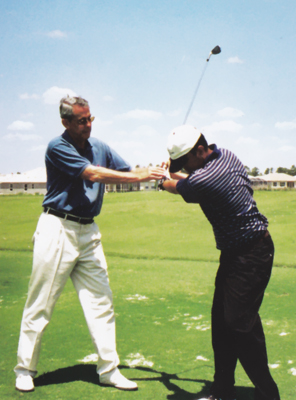Never Stop Learning
 A wise old pro once told me, “Mark, most experienced golf pros don’t want to hear teaching advice from other teachers. That’s because they already think they know it all.”
A wise old pro once told me, “Mark, most experienced golf pros don’t want to hear teaching advice from other teachers. That’s because they already think they know it all.”
The more I’m in the golf teaching business, the more I’m convinced how true that statement is on some levels. An experience that national coordinator Bob Wyatt and I encountered at a recent Level IV Master Teaching Professional course not only epitomized the old pro’s words, but brought to light a greater problem that plagues more than a few teachers.
Our class of 11 Level IV attendees was fairly typical in that it consisted of people who had taken their Level III certification and became learned, knowledgeable teachers. It quickly became apparent, though, that one person in particular wasn’t shy in letting everyone know just how learned and knowledgeable he was.
His desire to share his 12 years of teaching experience was appreciated, but in doing so, he made it quite clear that he was there merely to gain the Level IV certification, “help” Bob and I conduct the class, and not to participate in an exchange of ideas. That’s unfortunate, because the whole theme of the week is, in fact, “an exchange of ideas.”
Everyone who took the written teaching examination missed a few questions, which is common. When Bob and I explained the reasoning behind the given answers, everyone saw that the reasoning made sense – except for this particular fellow. He argued that his answers were correct, ours weren’t, and insinuated that he was wondering if we really knew what we were doing.
Now, before I go on, I have to tell you about this test. It was put together by five members of the USGTF Technical Committee, who have a combined 110 years of teaching experience. Each question and answer was approved unanimously by the committee. That in itself is quite a feat, considering the different teaching styles and methodologies employed by these five.
At our closing banquet, Bob imparted the words he always does to each and every class: “Never stop learning. If you stop learning and think you know it all, you are a fool. Good teachers don’t operate that way.” Perhaps our friend thought the words were directed personally at him. They weren’t specifically, but when Bob said them, we both knew that there was a special emphasis on them this time.
In my now 17-year-long teaching career, I’ve come across too many teachers who think they know it all, who think the swing method or system they teach is the only correct one, and think all other teachers fall short compared to themselves. It’s great to have a belief in your knowledge and methods – heck, it’s even required if you are to be successful. But if you think you are beyond learning any new technical wrinkles, or psychology/motor-learning aspects, or believe that other teachers have little or nothing to offer, you are simply wrong.
I’m proud of the knowledge and teaching ability I’ve accumulated, but I always want to hear what other teachers have to say. Sometimes their thoughts don’t pass the common-sense test, and we discuss it until they see that. Other times, they bring to my attention something that I’ve never considered, and I find myself grateful for learning a valuable new teaching nugget.
It’s also helpful to remember that, even if we are successful in the sense that we have many students and most of them improve under our tutelage, there are other ways to get the job done. Don’t be afraid to approach other successful teachers and ask questions. You are likely to find you will gain some insight into teaching this great game of ours. And, if you can help your fellow teacher with some insight of your own, all the better.
Page 21 of the American Golf Teaching Method has these words by John Dana: “Who dares to teach must never cease to learn.” In fact, Article 2 of the USGTF Code of Ethics requires all USGTF members to keep learning. How many of you knew that?
More importantly, how many of you are doing it?




